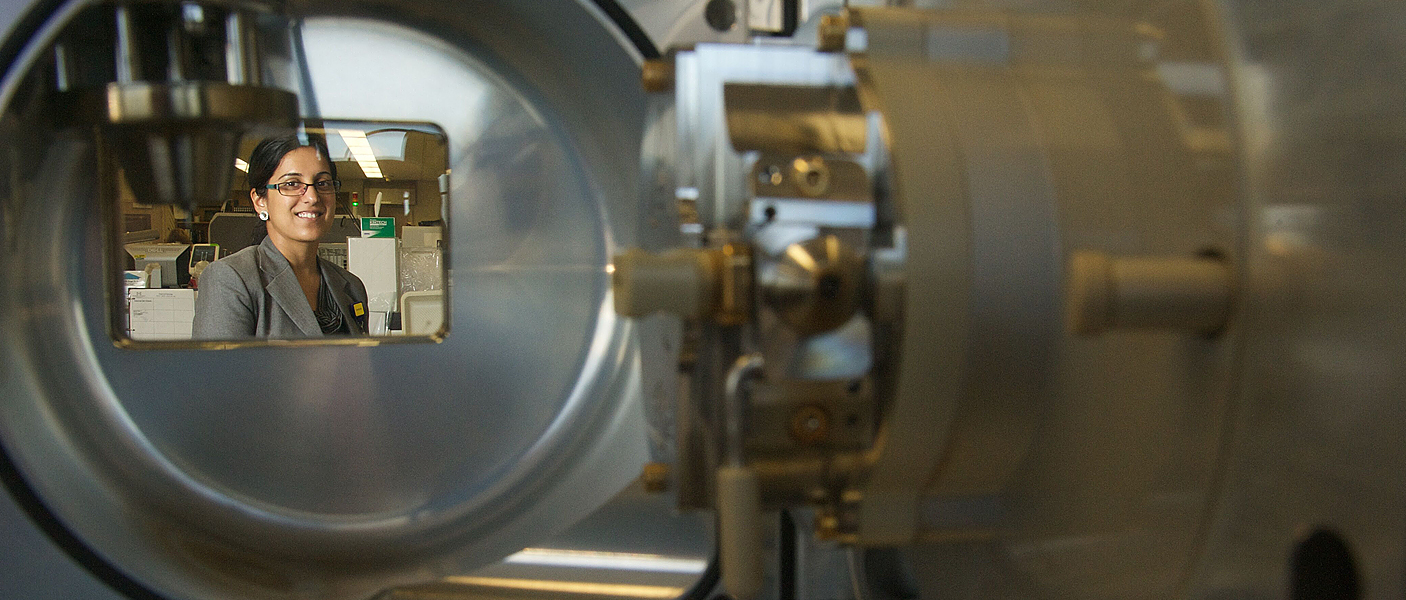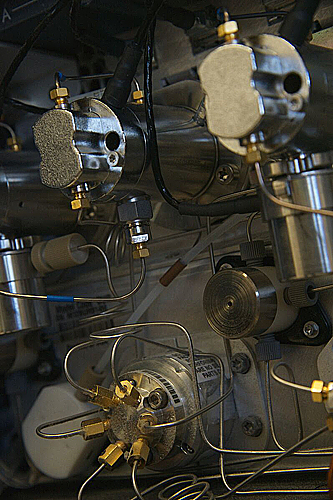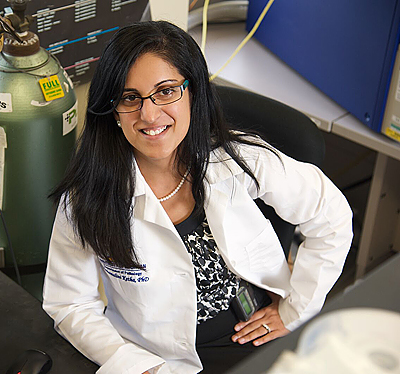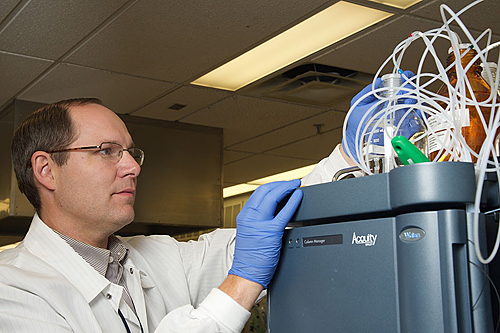

Mass spectrometry itself isn’t new. However, a revolution in the field of laboratory testing took place when companies were able to couple liquid chromatography (LC) with mass spectroscopy, creating a new hybrid instrument that had greatly improved specificity for distinguishing the various compounds of importance in clinical diagnostics. This innovation has allowed for tremendous growth in the number of institutions that have invested in LC-mass spec technology, because of the superior specificity and sensitivity that the hybrid approach offers.

Various parts of the LC-mass spec instrumentStill, it’s a field that is very new to many academic institutions. The methodology is new and it can be challenging to implement because of the significant amount of front end sample preparation that is required. Similarly, the financial investment can be significant and finding technical specialists who have the expertise to perform the testing can also be a challenge because training is not currently a regular part of most medical laboratory technician training schools’ curriculum. Moreover, most contemporary mass spec instruments aren’t automated, so everything is done manually. Sheridan Mattson, Toxicology Supervisor, explained, “Laboratory developed testing is what we do. We create it and make it our own so (protocols) can differ from laboratory to laboratory but we do comparisons and validation that results are the same but our process and extractions may be a little bit different.”
The methodology is new and it can be challenging to implement because of the significant amount of front end sample preparation that is required.
For these reasons, Dr. Hemamalini (Hema) Ketha, who is a clinical mass spectrometrist with an interest in toxicology and endocrine metabolites, was concerned about not being able to find a job that was the right fit. “One of my worries was that when I started looking for positions, I wouldn’t be able to practice (toxicology) as a general clinical Chemist.“
However, since the advantages of using LC Mass spec and the potential it has in improving patient care outweigh the challenges, quite a few tests have made the move to LC-mass spec in the chemical pathology lab at the University of Michigan Health System over the past two to three years.
Dr. David Keren, Director of the Division of Clinical Pathology explained, “Mass spectrometry testing is important for a wide variety of drugs that we use for transplant patient for instance such as Tacrolimus and Cyclosporine, but it’s also involved in a lot of other things, confirmation for different drugs of abuse, it’s also involved these days in looking at hormones. A lot of hormones that we measure by techniques such as immunoassays can also be measured by mass spectrometry. In mass spectrometry the reagent is much cheaper. Not only is it cheaper, it’s also much better in many ways because it’s not interfered with by things such as high dose hook effect, which another term for is antigen excess effect that all antibody reagents have a problem with and also something we call heterophile antibodies, which are antibodies made by other species. Both can interfere with the numbers we get and by moving forward with what other major centers are, and developing a lot of these assays by mass spectrometry, we will cut our costs and improve the quality of our testing.”
When Dr. Thomas Annesley retired in December of 2012, there was an opening for a new clinical chemist. However, the Department of Pathology was in the process of a chairmanship change so hiring someone was put on hold for a time. In spring of last year, Dr. Keren, and Director of Clinical Chemistry, Dr. Don Giacherio, made the decision to actively pursue hiring someone and started the search for a new Associate Director of Clinical Chemistry and Director of Toxicology.
“I wanted a scientist who was relatively fresh out of training because techniques in these fields are changing very rapidly and I would like somebody who had been at a place, such as the Mayo Clinic, which is where Hema came from, that would have had the newer instruments and would be trained by a national leader,” Dr. Keren said.
Drs. Giacherio and Keren also wanted a clinical chemist with LC-mass spec experience since they wanted to focus on development in that area. They advertised with the American Association of Clinical Chemistry.
“When I started looking for positions I had an ideal position in mind. When I saw this position, I almost felt to myself, could it be this good?” Ketha explained. “I paged my husband, ‘Finally the University of Michigan has a position and it’s really, really good.’”
Around 30 applications were received and Dr. Keren worked with Dr. Giacherio and his fellow chemical pathologist Dr. Lee Schroeder to narrow the field down to two, who were invited for interviews and to give talks.
"I wanted a scientist who was relatively fresh out of training because techniques in these fields are changing very rapidly and I would like somebody who had been at a place...that would have had the newer instruments and would be trained by a national leader." -- Dr. David Keren
Through her post doctoral fellowship and clinical chemistry fellowship, Dr. Ketha was very involved in discovering physiological manifestations of vitamin D and its metabolic process. Her talk discussed how different metabolites measured in different clinical scenarios can potentially be useful in improved patient care. She explained, “We know vitamin D is a hot topic. We know that vitamin D deficiency and supplementation is a topic of concern from a public health perspective but from a biochemical perspective vitamin D endocrine system is an important regulator of calcium homeostasis and that’s what most of my research had been focused on, to look at the use of different vitamin D metabolites in better managing the disorders of calcium homeostasis.”

Hema Ketha
Hema Ketha with Larry Clayton, Senior Medical Technologist with one of the lab’s 5 LC-mass spectrometers“When I came here and saw the lab, I thought, this is it! This is exactly going to offer me what I have been looking for. The other important part was how I felt when I came here. The lab staff, the faculty, Dr. Parkos, everyone was so warm when I came here. All were very considerate, very warm, very welcoming. There are some places you know you’re a good fit. You know you’re going to go there and be able to contribute to the group and still be able to grow, doing what you’re doing, and that’s what I felt when I came here. When a position offers you potential to grow, where you want to grow yourself, that almost becomes a perfect fit and that’s why University of Michigan was my top choice.”
Ketha was also the top choice for Drs. Keren, Giacherio, and Schroeder. Said Dr. Giacherio, “Dr. Ketha was clearly our first choice. She stood out. She had a lot of experience with mass spec, been through a very well regarded fellowship program that gives you a lot of lab management background experience as well. She was in a fellowship program so she had to finish her fellowship which ended June 30th and July 1st she was here.”
With the addition of Dr. Ketha, the lab will be able to move toward fulfilling some goals that have been set for a number of years. One goal is increasing the utilization of mass spec testing in the lab. “For the past five years that’s one of the technologies of the future in lab medicine. It’s an important feature in moving forward with lab testing and the ability to get more specific and more sensitive in detecting compounds. We have a senior clinical technologist, Larry Clayton, who does most of our development work who is sort of our expert on LC-mass spec and Dr. Ketha has spent a considerable amount of time with Larry talking about what he’s done, how we do it, and developing a strategy for moving forward on our priority list of things we want to do.” Dr. Giacherio explained.
Dr. Ketha feels lucky to be with the department and said, “The most exciting part of being at University of Michigan right now is that we are so much ahead in terms of clinical applications of mass spectrometry in our laboratory. We are really ahead in the game as far as academic medical centers go. There are more and more new instruments that are coming in within the field of mass spectrometry and being able to expand that is the goal. I think that’s where the field is going. I think we’re going to be at the leading edge are far as academic hospital centers go and this methodology goes so I think that’s the most exciting part for me. We’re implementing more and more mass spec in our lab, in microbiology and, hopefully, in immunology. Mass spec is going to invade all the areas. It’s going to continue to grow and that’s what brought me here.”

Sheridan Mattson, Toxicology Supervisor, with the LC-mass specAs part of that expansion and growth, Dr. Ketha is hoping to add a TOF, or time of flight, machine to the labs instrumentation. Another goal she has is to have an open dialog across the departments in order to better understand workflows and what physicians need in order to provide the best clinical care possible from an analytical and technical standpoint. To do this, she is communicating face to face; getting involved in going to endocrine or cardiology grand rounds to see what’s really happening in those areas and learning from the physicians which assay development and implementation will help their patients most. She’s also hoping to move ahead with collaborative clinical studies, and to increase awareness about the work that is being done in the lab by attending conferences.
Dr. Giacherio said, “I couldn’t really be happier than how it’s worked out. She’s acclimated herself to the lab, she’s jumped in, interacted with people. She’s a hands-on person which is exactly what we were looking for. So it’s working out really great. Her expertise is already helping us as we plan for devoting the effort to bring these tests on board.”
Dr. Ketha believes in being hands-on and describes a situation a few weeks ago in which she was looking into replacing some old instruments and the lab staff was complaining about an old vacuum dryer they were using. She decided she needed to check it out herself, “I spent an extra three hours because that instrumentation is so old. It works, it’s robust, it’s just behind its time. I realized we need to change this.”
The staff was happy to learn that a new dryer would be purchased. “That’s how I like to communicate,” Ketha said. “I need to get in there and work in their environment and see what they need. If I can’t do it, I’m not expecting them to do it. If you don’t understand the methodologies in your own laboratory, you’re not going to be a good clinical chemist, that’s just the way it is. So, I try to spend time in the lab and when I do that, it’s not because I have to, it’s because I want to.”
She added, “I feel there is a certain calmness in the chaos that happens in the laboratory. I do. Whenever I feel like I need to feel good, I go in and I just sit there. When the instruments are going and the people are just methodically working through the chaos, it almost feels like a calming experience for me. So I just try to go there and just watch them and don’t do anything just watch them. And that makes me feel, there you go! Being able to contain that chaos and continue to move forward, I love that!”
Drs. Giacherio and Keren are also happy to have Dr. Ketha on board to help teach the residents and fellows, especially with the addition of the chemical pathology subspecialty fellowship which started this year. “We’re looking forward to moving this along and having Hema there to help teach people this advanced technique will be a great plus for that program.” Dr. Keren said.
"I try to spend time in the lab and when I do that, it’s not because I have to, it’s because I want to."
-- Dr. Ketha
Dr. Keren is also hoping that Dr. Ketha will step in to lead when Dr. Giacherio is on vacation or attending meetings, saying, “It deepens our leadership in an area which has the largest number of laboratory tests done in all of the clinical laboratories. She’s an absolutely delightful individual. We’re so happy that she’s here.”
Recently, Dr. Ketha won first place for her oral poster presentation, at the American Association for Clinical Chemistry (AACC) annual meeting which was held in Atlanta. The poster, of work that Dr. Ketha did at the Mayo Clinic was titled, “High Resolution Accurate-mass Mass Spectrometry (HRAMS) Offers Superior Accuracy for Quantitation of Steroids and Proteins.” The AACC meeting is the largest clinical laboratory meeting in the world with well over 15,000, as many as 20,000 people in attendance. “For Hema to win the very best oral poster was quite an achievement. I think she’s going to be very happy at the University of Michigan and we’re already very happy with Hema.” Dr. Keren said.
However, Ketha credits the staff for allowing her to do the work she does and is particularly pleased with the staff in her lab at University of Michigan saying, “We are very lucky here to have a great staff. They are all technically, clinically, very sound. Many have spent decades in the laboratories. It’s not only that they come and process the sample and go home, they’re actually invested in the care of the patient and I feel that that’s really the one thing you need to move forward, a great staff in the laboratory. It’s a dream job to start my career here. I never knew what that meant. I’ve heard that being said, ‘When you do what you love to do, then it doesn’t feel like work, it feels like you’re having fun.’ And that’s how I feel here. I didn’t come here thinking of it as a job option. I came here wanting to live a life here. We see our family growing here. I’m here to stay.”
